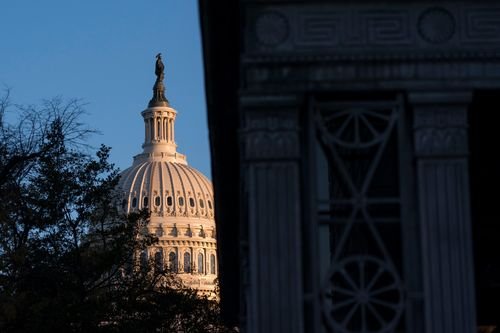House votes to repeal Iraq War authorization

The House voted Thursday to repeal the 2002 legal authorization for the war in Iraq, marking what the bill’s backers hope is a first step to curbing the President’s expansive war powers enacted after the September 11, 2001, terrorist attacks.
The House voted 268-161 to repeal the authorization, with 49 Republicans joining Democrats to back the measure authorized by Rep. Barbara Lee, a California Democrat. One Democrat voted against the bill.
The vote occurred after the White House said this week that it supported repealing the 2002 war authorization — the first time the Executive Branch has explicitly backed the effort — saying that the legal authority in Iraq was no longer necessary.
The Senate is taking up similar legislation in the Senate Foreign Relations Committee next week, and Senate Majority Leader Chuck Schumer said he planned to put that legislation on the Senate floor this year. It’s still not clear whether the measure would be able to gain enough support from Senate Republicans to reach the 60 votes needed to pass, however, as Senate Minority Leader Mitch McConnell expressed his opposition on Thursday.
The push to repeal the 2002 Iraq AUMF is seen by its supporters as an initial step toward their larger goal of replacing the 2001 war authorization — an expansive measure passed in the days after the 9/11 attacks — in order to put more checks on how the US uses its military around the world to fight terrorism.
It’s an effort that’s been underway for years now, but lawmakers see the potential support from President Joe Biden — who was Senate Foreign Relations chairman when both authorizations were passed — as key to finally rewriting the 2001 AUMF.
“He’s living up to what he knows is right, and he was very clear in his statement as to why this was important,” said Lee, who was the only member of Congress who voted against the 2001 authorization.
“This has been a long time coming, but the importance of the Biden administration issuing this can’t be understated,” Lee said.
Republican defense hawks opposed the repeal of the 2002 war authorization, charging that it was a misguided effort that ties the hands of the US military to fight terrorism. Their arguments were a preview of the challenge that lies ahead in finding an agreement that would replace the 2001 war authorization.
“What message would this send to the terrorists who are on the ropes, who haven’t attacked in the US not because they haven’t wanted to but because we haven’t let them, because we’ve fought them on their territory,” said Rep. Adam Kinzinger, an Illinois Republican.
Sen. Tim Kaine, the Virginia Democrat who has led the push to rewrite war authorizations in the Senate, said he and Senate Foreign Relations Chairman Robert Menendez have been in discussions with the White House about how to rewrite the 2001 war authorization.
There are multiple issues that must be addressed, including the scope of the authorization, which countries it would cover, whether there would be an end date and how US ground troops can be used without an explicit authorization. The issues create a difficult balancing act to find a solution that would satisfy anti-war Democrats as well as the Executive Branch that doesn’t want to harm its ability to fight terrorism.
Kaine remained optimistic that a solution could be found, and he’s eying the 20th anniversary of the September 11 attacks.
“We’d like to get to a handshake deal in September, but we’re not rushing,” Kaine said.
The 2002 war authorization in Iraq isn’t currently in use by the Biden administration. But it was cited in 2014 when the Obama administration sent troops back into Iraq to fight ISIS, as well as by the Trump administration in its airstrikes against Iranian military general Qasem Soleimani.
Kaine and GOP Sen. Tim Young of Indiana have introduced the legislation in the Senate to repeal both the 2002 Iraq War authorization and the 1991 authorization that’s still on the books. Kaine argued it was an important step to show that Congress can claw back powers it had once granted to the Executive Branch.
“Congress hadn’t repealed an AUMF as far as I know,” he said. “So this is the first step in showing we’re taking this seriously again. … We have a White House willing to work with us, not a White House that says we want to keep them all on the books just in case.”
Still, it could be a challenge for Kaine and Young to find enough Republicans to support their bill and overcome a filibuster. Just before the House voted to repeal the 2002 Iraq authorization on Thursday, McConnell gave a speech on the Senate floor arguing that repealing the bill would not help solve the terrorist threat to the US.
“The fact of the matter is the legal and practical application of the 2002 AUMF extends far beyond the defeat of Saddam Hussein’s regime,” McConnell said. “And tossing it aside without answering real questions about our ongoing efforts in the region is reckless.”
This story has been updated with additional developments Thursday.

